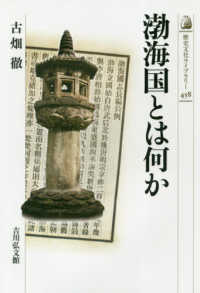- ホーム
- > 洋書
- > 英文書
- > Biography / Autobiography
Full Description
In 1462 Pope Pius II performed the only reverse canonization in history, publicly damning a living man. The target was Sigismondo Malatesta, Lord of Rimini and a patron of the arts with ties to the Florentine Renaissance. Condemned to an afterlife of torment, he was burned in effigy in several places in Rome. What had this cultivated nobleman done to merit such a fate?
Pagan Virtue in a Christian World examines anew the contributions and contradictions of the Italian Renaissance, and in particular how the recovery of Greek and Roman literature and art led to a revival of pagan culture and morality in fifteenth-century Italy. The court of Sigismondo Malatesta (1417-1468), Anthony D'Elia shows, provides a case study in the Renaissance clash of pagan and Christian values, for Sigismondo was nothing if not flagrant in his embrace of the classical past. Poets likened him to Odysseus, hailed him as a new Jupiter, and proclaimed his immortal destiny. Sigismondo incorporated into a Christian church an unprecedented number of zodiac symbols and images of the Olympian gods and goddesses and had the body of the Greek pagan theologian Plethon buried there.
In the literature and art that Sigismondo commissioned, pagan virtues conflicted directly with Christian doctrine. Ambition was celebrated over humility, sexual pleasure over chastity, muscular athleticism over saintly asceticism, and astrological fortune over providence. In the pagan themes so prominent in Sigismondo's court, D'Elia reveals new fault lines in the domains of culture, life, and religion in Renaissance Italy.















